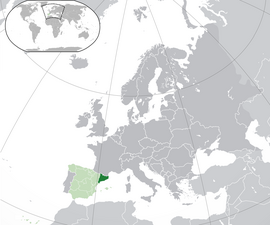Catalonia
Catalonia (Catalan: Catalunya; Spanish: Cataluña; Occitan: Catalonha) is a Spanish autonomous community. It is south of the eastern Pyrenees, and has a northern border with France. Catalonia is made up of four provinces: Barcelona, Tarragona, Girona (Spanish: Gerona) and Lleida (Spanish: Lérida). It has a population of over 7 million people. Catalonia has three official languages, which are Catalan, Spanish and Occitan, spoken in a small region within Catalonia, which borders France to the North, known in Occitan as Val d'Aran.
The capital city of Catalonia is the city of Barcelona, which was home of the Olympic Games in 1992. This city is on the Mediterranean Coast, between Costa del Garraf and Costa del Maresme, being very popular amongst tourists in summer, whether foreign or national. The Catalan people have autonomy within Spain. This means they have their own local government, their own police and some control over their own community. In September 2005, the Catalan Parliament decided to call Catalonia a 'nation' in the Statute of Autonomy of Catalonia approved in 2006, according to the Spanish Constitution which says that Spain is a group of historical nationalities and regions. But this declaration has no judicial status whatsoever though, as it only appears in the preamble to the law.
Catalonia is one of Southern Europe's most prosperous regions, mostly because industrialization began there earlier and took place faster than in other Spanish territories, above all the textile industry. The region is also greener than Southern Spain as it gets more rain, and also different kinds of crops are grown there. Catalonia, especially the North, is much less hot than the rest of Spain.
On 27 October 2017, Catalonia declared independence from Spain after a vote in parliament, but it has not been recognized by the international community.[8]
References
- ↑ "IIdescat. Statistical Yearbook of Catalonia. Population density. Counties and Aran, areas and provinces". www.idescat.cat. Retrieved 13 July 2017.
- ↑ "Indicadors geogràfics. Superfície, densitat i entitats de població: Catalunya". Statistical Institute of Catalonia. Retrieved 23 November 2015.
- ↑ https://ec.europa.eu/eurostat/documents/2995521/9618249/1-26022019-AP-EN.pdf/f765d183-c3d2-4e2f-9256-cc6665909c80
- ↑ "Report for Selected Countries and Subjects". www.imf.org.
- ↑ "Statute of Autonomy of Catalonia". Gencat.cat. Archived from the original on 28 May 2008. Retrieved 13 September 2013.
{{cite web}}: Unknown parameter|deadurl=ignored (|url-status=suggested) (help) - ↑ "The Spanish Constitution" (PDF). Agencia Estatal Boletín Oficial del Estado. BOE. Retrieved 26 July 2016.
- ↑ "Sub-national HDI - Area Database - Global Data Lab". hdi.globaldatalab.org. Retrieved 2018-09-13.
- ↑ Sandford, Alasdair (27 October 2017). "Catalonia: what direct rule from Madrid could mean". euronews. Retrieved 27 October 2017.
Notes
- ↑ Catalan and Occitan are the own languages of Catalonia and Aran (respectively) and official languages of the autonomous community of Catalonia according with its Statue of Autonomy.[5]
- ↑ As "the official language of the State", according with the Spanish Constitution.[6]




